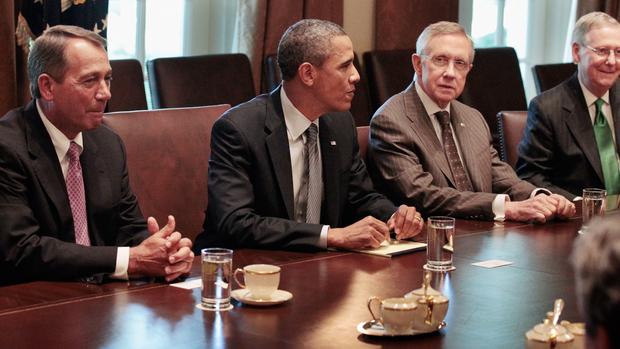Debt deal nears finish line
WASHINGTON - A deal that heads off an unprecedented U.S. financial default and begins the process of curbing the country's spiraling debt was expected to clear a final legislative hurdle in the Senate on Tuesday, just hours before the deadline.
President Barack Obama promised to sign the measure immediately.
The Senate began debating the measure early. It raises the current $14.3 trillion cap on U.S. borrowing, which expires at midnight. The House of Representatives passed the measure Monday evening by an unexpectedly large margin.
The legislation's backing from Senate Majority Leader Harry Reid and Republican leader Mitch McConnell virtually guarantees it will receive the 60 votes required when it comes to the floor of the upper chamber at noon.
CBSNews.com special report: America's debt battle
Debt deal rankles liberals, Tea Partiers in the House
Debt deal could boost Obama in 2012
The administration has said that without the new borrowing authority, the government could not pay all its bills. Administration officials say a default would ensue that would severely damage the global economy.
The bitterly fought legislation pairs a long-sought increase in the government's borrowing cap with promises of more than $2 trillion of budget cuts over the upcoming decade.
Giffords has been undergoing rehabilitation since she was gravely wounded by a gunshot that pierced her brain. She acknowledged her warm welcome, standing among well-wishing colleagues, raising her left hand to waive to fellow legislators. Her office said she had returned Monday in support of the measure that was passed by the House.
"She proved her determination is as fierce as we all knew it was. And it was ... absolutely electrifying," Rep. Debbie Wasserman Schultz, D- Fla., who helped escort Giffords into the chamber, said on "The Early Show."
The measure was crafted through the crucible of one of the United States' nastiest political fights in recent history. It carefully threaded the needle between the philosophically opposite ends of the political spectrum.
Speaking to CBS Evening News anchor Scott Pelly, House Speaker John Boehner said he got 98 percent of what he wanted. Republicans hailed the $2.3 trillion worth of deficit cuts in the deal, though some wanted more.
Polls showed that Congress and Obama have taken a sharp hit in U.S. public opinion because of the prolonged battle over lifting the debt ceiling, something that past Congresses have done as a matter of course.
Without legislation in place by the end of Tuesday, the Treasury would run out of cash needed to pay investors in Treasury bonds, recipients of Social Security pension checks, anyone relying on military veterans' benefits and businesses that do work for the government.
Treasury Secretary Timothy Geithner told ABC News Monday that he doesn't know if the bruising debt-limit battle will harm America's Triple-A credit rating, but says he fears "world confidence was damaged by this spectacle."
Geithner said the credit rating is "not my judgment to make." Rather, he said, "this is, in some ways, a judgment on the capacity of Congress to act."
What follows next is more complicated. The measure establishes a special bipartisan committee to draft legislation to find up to $1.5 trillion more in deficit cuts for a vote later this year. They're likely to come from so-called mandatory programs like federal retirement benefits, farm subsidies, Medicare and Medicaid. The savings would be matched by a further increase in the borrowing cap.
There's no guarantee the committee, to be evenly split between the warring parties, will agree on such legislation. But there are powerful incentives to do so because more budget gridlock would trigger a crippling round of automatic cuts across much of the budget, including Pentagon coffers.
On Monday, the White House dispatched Vice President Joe Biden to the Capitol to lobby recalcitrant Democrats in both House and Senate. He heard an earful, especially from liberal and black lawmakers upset that Obama surrendered on taxes and agreed to cuts from a budget ledger built up over the first two years of his term, when Democrats dominated Congress.
"They expressed all their frustration," he conceded after a session with House Democrats.
Biden said the deal "has one overwhelming redeeming feature" — postponing the next debt limit battle until 2013 and leaving the current fight behind. "We have to get this out of the way to get to the issue of growing the economy," he said.
